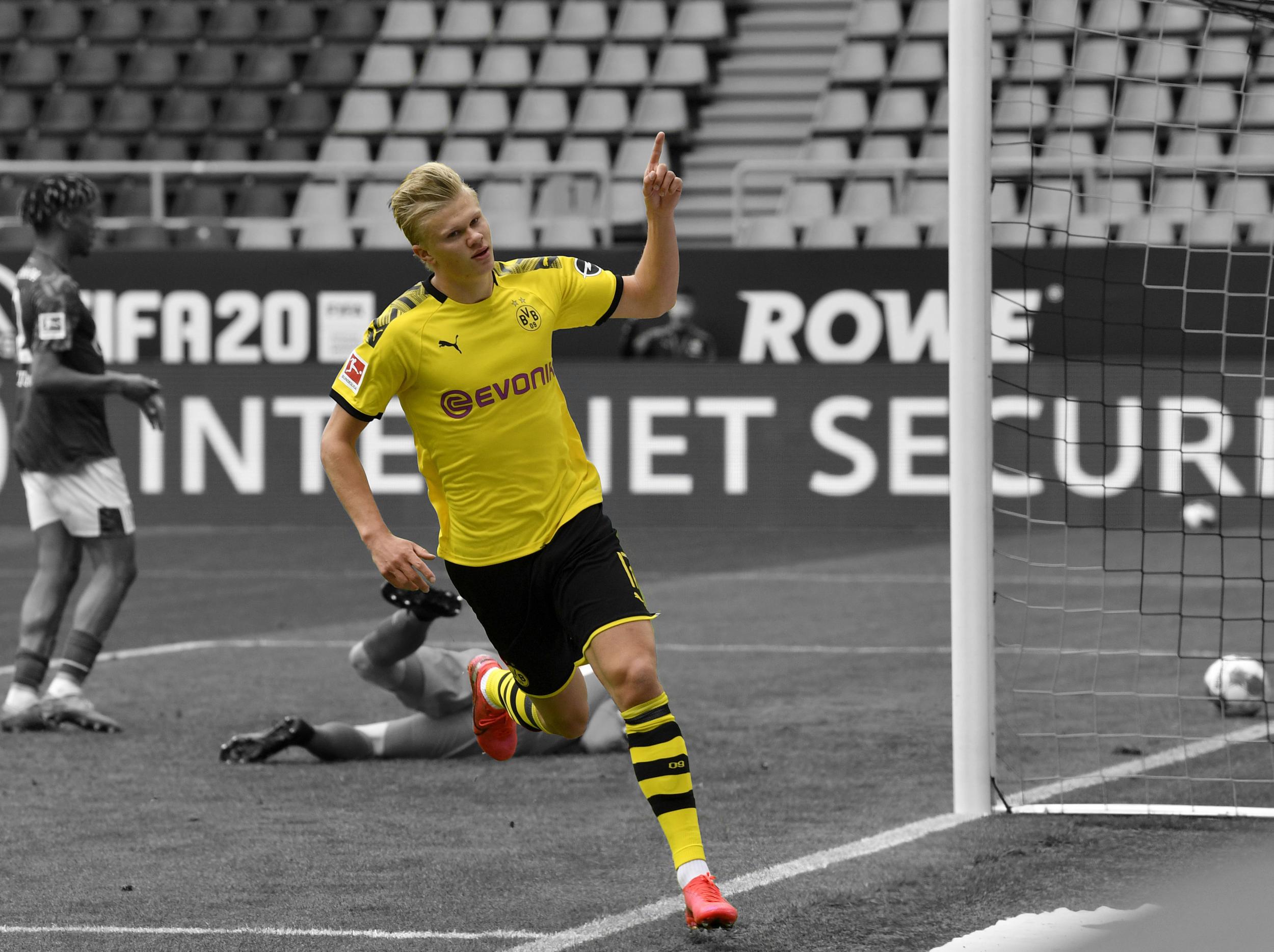Erling Braut Haaland’s moment of brilliance proved that football without fans is still football
The irony of the Bundesliga’s strange return is that the starkness of it distilled football to its purest form, writes Miguel Delaney

As Erling Braut Haaland celebrated the first goal on Saturday – and the first goal of football’s new coronavirus era – it provoked a lot of emotions, but not all of them were celebration for Borussia Dortmund or disappointment from Schalke.
There was amusement, bemusement, simple enjoyment but even some disgust.
Many were just happy to see one of football’s most fundamentally joyous moments, a little bit of life again.
One prominent football figure was privately complaining that this – Haaland “socially distant celebrating” in front of empty stands – is not what football is about. Many supporters presumably feel the same, even if views on this on either side are inevitably influenced by how much any outcome suits their own emotional investment.
The lack of noise from the stands has been compensated for by a lot of noise online, for what is of many prominent tangents from one of the most historically consequential weekends in the sport’s history.
Whatever about getting the game going again, it has provoked yet another culture war about what football and football fandom are “really about”.
Football with fans is nothing, according to some.
Any football is something, according to others.
The irony of a situation like Saturday’s is that the starkness of it all means you can start to actually break it down, as to what the game is.
This really was football stripped down, distilled to its purest form: people just kicking a ball on a pitch.
The innocent joy of that is how many of us were introduced to the game in the first place, and the initial source of how we developed connections to clubs to eventually enjoy these collective experiences.
Except, these players were not just people. They’re still the game’s elite performers, not least figures like Haaland.
From all that, there’s a fairly pure truth, regardless of how you feel about the importance of supporters being present.
It’s hard to know how any football fan could not enjoy Haaland’s supreme finish, or the move that led to it. The same is true of Raphael Guerreiro’s inventive finish later on.
This was just the game as it should be played, exquisite expressions of technique, the quality of the players allowing them to surprise us – and excite us – through the innovation their ability allows.
That would be true whether there is a crowd there or not.
If we don’t enjoy that, there’s a fair question: why do you watch?
At the same time, it’s completely understandable that many would lament the fact such a moment was not enriched and infused by the enlivening presence of support.
Imagine how much better it would have been with the growing appreciation of the crowd – that is signalled by that growing murmur as a move develops, that sudden pause in singing a chant – that builds to a crescendo of excitement, awe and emotional release, all in the space of a few seconds. There’s then that that extra aftershock of sound that comes with the approval and satisfaction at this being the type of goal being scored. It carries the celebration just that big longer.
It has more, and makes it mean more.
That thought feels all the more poignant given the Bundesliga has one of the most buoyant fan cultures in the world.
The entire episode nevertheless reflects how there is a broad spectrum of support, with two distinctive ends.
On one side, there are those who love it purely for the actual football. They’re there to watch the actual game.
On the other, there are those for whom the football is really just the vehicle for a sense of community; a day out together. Perhaps the extreme example of this is that famous type of ultra who spends entire games with their back to the football so they can conduct the crowd in a vast communal experience. They’re at every match, but see none of it. They just make sure everyone else hears all of it.
In the middle, then, there’s the vast, vast majority of us. We love the game and consume it because of a joyous combination of those elements.
The pure joy of a ball being kicked got us into it, led us to fall in love with teams who we felt represented us when doing it, and then to collective experiences with people who felt the same way. The game became the day out, and so much more.
All of it can be “real football” all at once.
The reality right now is the game just can’t be all of this together.
And the greater sadness is that it may be like this for some time, maybe into next year. Maybe longer. Hopefully not.
The response to that in such dire times should not be to complain about the lack of a perfection we all crave. There’s not much we can do about it.
The response should be to revel in the small moments that make us someway feel what it’s really about.
That isn’t just better than nothing. It should be something to hold onto. That’s what a goal, and celebration, like Haaland’s represented.
Subscribe to Independent Premium to bookmark this article
Want to bookmark your favourite articles and stories to read or reference later? Start your Independent Premium subscription today.

Join our commenting forum
Join thought-provoking conversations, follow other Independent readers and see their replies